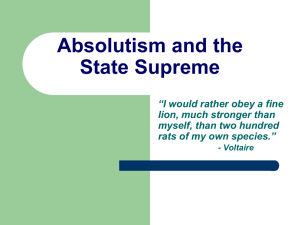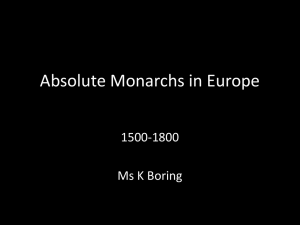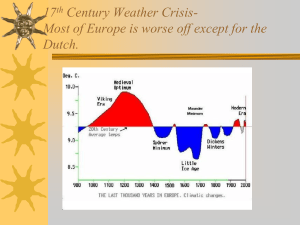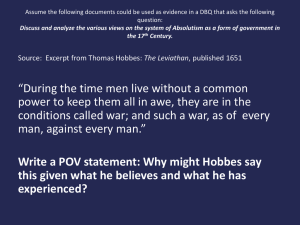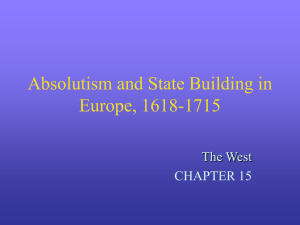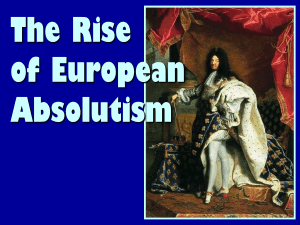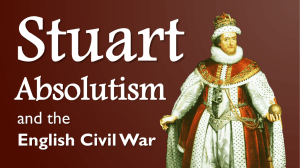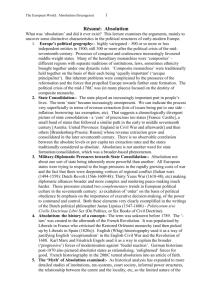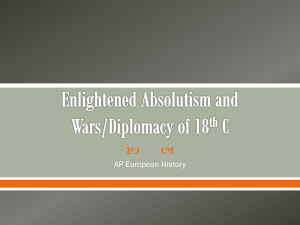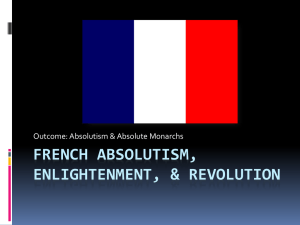The Rise of Absolutism - Mrs. Silverman: Social Studies
advertisement
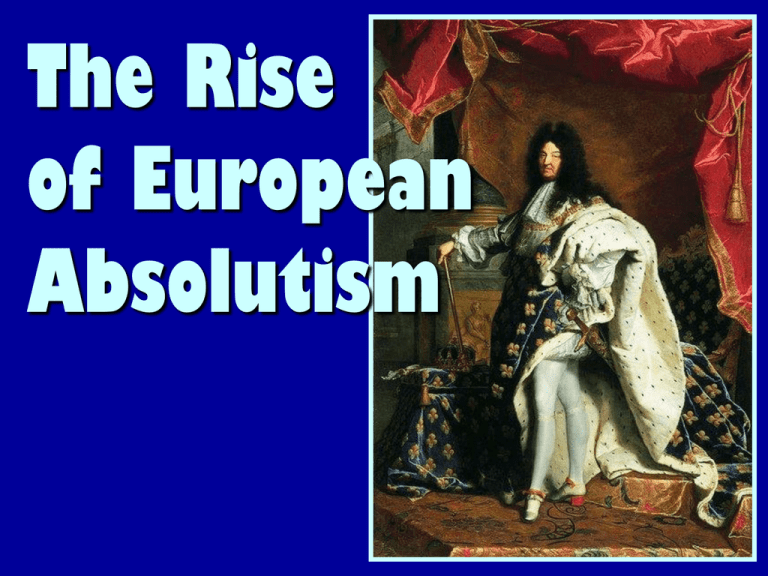
The Rise of European Absolutism What is Absolutism? • Absolutism: • A form of government in which all power is vested in a single ruler or authority The Divine Right of Kings • The belief that God granted monarchs with the power to rule • Implications: • The king was answerable ONLY to God Development of Absolutism • Long-Term Causes of Absolutism: • The rise of cities & the support of the middle class • The growth of national kingdoms • The loss of authority within the church • The decline of feudalism Development of Absolutism • • • • • Immediate Causes of Absolutism: Religious and territorial conflicts Revolts by peasants and nobles The growth of national armies The need for higher taxes Long-Term Causes Immediate Causes ABSOLUTE RULER Immediate Effects Long-Term Effects Effects of Absolutism • Immediate Effects of Absolutism: • Strict regulation of religious & social gatherings • Loss of power among the nobility • Tight economic controls • Large building projects Effects of Absolutism • Long-Term Effects of Absolutism: • The westernization of Russia • Widespread political reforms in England; significant impact on the development of U.S. democracy • Political revolution in France After the Age of Exploration, FIVE European countries emerged and began to dominate Europe… ENGLAND FRANCE AUSTRIA PRUSSIA RUSSIA Russian Absolutism Ivan the Terrible Boyar Policy • • • • Boyars: Russian nobles Boyar Policy: Ivan reduced the nobility’s threat to the throne by seizing their land and placing it under his control Oprichniki • Established by Ivan the Terrible • A secret police force that was used to terrorize the Russian people Peter the Great Western Customs • Peter the Great forced the Russian nobility to adopt western customs • EXAMPLES: • Clothing • Hair Styles • Women & parties NOOO! Not the beard!! Saint Petersburg • Built a new Russian capital • “Window to the West” • Nobles were required to have a house in Saint Petersburg Territorial Expansion • Peter the Great took territory from Sweden • Gave Russia access to the sea • North Baltic region Noble Taxation • Russian nobles paid NO taxes • Burden fell on the poor in Russia Economic Reforms • Brought agriculture & craft production under strict government control • Gave incentives to increase production in mining & metalworking The German States The Thirty Years War • Religious conflict in the Holy Roman Empire (Germany) • Protestant States v. Catholic States • The Peace of Westphalia ends the war • Divides the Holy Roman Empire into 30+ Kingdoms Austria • The Hapsburg family of Austria sets up a strong monarchy • Most famous monarch – Maria Theresa (1740) Prussia • Very militaristic • Becomes the most powerful of the German states • The heart of modern-day Germany France Edict of Nantes • A declaration of religious toleration • Issued by Henry IV • Granted Protestants the right to worship in areas where they were a majority Edict of Nantes • Ended religious strife in France • Allowed the French to focus on “rebuilding” “Rebuilding” • • • • • Henry IV: Issued the Edict of Nantes Restored the crown’s treasury Supported trade/industry Gained the support of the common people Intendants • Local administrators who represented the crown • Administrators came from the middle class • King had the power to appoint & remove these administrators Intendants • Weakened the power of the nobility • Originally introduced by Louis XIII’s chief minister Cardinal Richelieu Huguenot Policy • Huguenots: French Protestants • Richelieu believed Huguenot cities prevented a strong centralized government from forming that Huguenot Policy • Directed an attack on Huguenot seaports, but maintained religious toleration French Academy • Established by Cardinal Richelieu • Established fixed rules for the French language; became the preferred language of European diplomacy • Elevated FR on the international scene “L’etat, c’est moi” • King Louis XIV: • The “Sun King” • Source of all political authority in France Palace of Versailles Built by Louis XIV Noble Taxation • Nobles were exempt from paying most taxes • Helped the king gain loyalty while reducing the power of the nobles Huguenots (1685) • In 1685 the Edict of Nantes was revoked • Ended religious toleration for Protestants • All Frenchmen under the control of the Catholic Church
